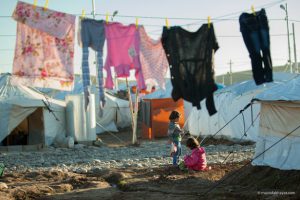
This course can be taken as stand-alone, or as part of the Diploma in Human Rights and Forced Displacement.
Course Description
This certificate course engages in an in-depth study and analysis of the contemporary international and regional systems for protection of refugees. Issues concerning international protection of refugees have undergone a sea change from the 1950s when the international instruments for protection of this vulnerable group of persons was first adopted. The contemporary world order poses serious challenges to their protection, beginning with identifying refugees within mixed migratory flows, inadequate national policies by states to protect them, their incompatibilities with international law, the challenges to durable solutions, the role of international organisations and bodies like the United Nations High Commissioner for Refugees (UNHCR), issues of xenophobia and security in host countries amongst various other issues.
This e-learning course is designed to provide a comprehensive picture to participants on what the international system for the protection of refugees is from the international and regional perspective, what are their needs and available legal protections, which are the relevant actors involved in their protection and what are the challenges facing today’s refugees and host countries. The course also analyses the regional systems protection with the help of selected case studies. It further explores the emergence of the new Global Compact for Refugees, its challenges and prospects. The course is based on a dynamic pedagogy including reading materials, video clips, case studies, and interactive webinars with the instructor as well as officials of UNHCR.
Course Outline
- Week 1: Contemporary international framework for refugee protection
- Week 2: Refugee Status Determination and the role of UNHCR
- Week 3: Durable Solutions
- Week 4: Protection of refugees, gender and rights of the child
- Week 5: International and Regional legal mechanisms for protection
- Week 6: Contemporary challenges to protection of refugees
Who Should Apply
The course is intended for staff members of NGOs and government agencies advocating for and working on the protection of refugees, staff of inter-governmental agencies and others interested in these issues. Candidates should have a good written command of English and have high competence and comfort with computer and Internet use.
About the Instructor
Dr. Mihir Kanade (India) is the Director of the UPEACE Human Rights Centre and is also the Head of the Department of International Law and Human Rights at UPEACE. His principal area of academic research and study is Human Rights and Globalization, covering several themes within that interface including forced migration, sustainable development, indigenous peoples’ rights, public health, trade and investment, amongst others. He has extensive experience in training staff of inter-governmental, governmental and non-governmental organizations, as well as professionals, in the field of human rights. He acts as an advisor to several human rights organizations and corporations on issues related to human rights and international law. He is also an adjunct faculty at Universidad Alfonso XI El Sabio (Spain), Cheikh Anta Diop University (Senegal), and Long Island University (United States). He has a LL.B from Nagpur University (India) and a Masters degree and PhD from UPEACE. Prior to his pursuit in academia, Mihir practiced for several years as a lawyer in the Bombay High Court and in the Supreme Court of India, focusing on issues of fundamental human rights violations. He has taught numerous professional certificate online courses on the protection of refugees and stateless persons over the last eight years.
Course Fee
For Certificate: Fee for taking this course is USD 600. UPEACE students and almuni enrolling for the Certificate course are entitled to 30% discount on the fee.
For Auditing: It is also possible to audit the course, in which case, participants will not receive a certificate. Auditors, however, will have access to all course material, be able to participate in the synchronous webinar sessions, and be able to monitor the online discussions of participants. The fee for auditing the course is USD 200.
For Certificate and 2 Academic Credits: Participants are also able to take the course for two academic credits offered by UPEACE. The cost of taking the course for 2 academic credits is USD 1100.
Application Procedure
To apply, please fill up the enrolment form. Applicants will be contacted within three working days of the application. The diploma is limited to 25 participants.
Payment
Payments may be made either by credit card or by wire transfer. Payment by wire transfer usually takes three to four business days to be deposited in our account. Payment by credit card is instant.
If you wish to make the payment by credit card, please go to https://payments.upeace.org/hrc/
Payments by wire transfer must be made to the following bank account:
Universidad para la Paz
Banco Nacional de Costa Rica
Bank account number:100-02-099-600195-4
Swift Code: BNCRCRSJ and IBAN: CR57015109910026001958
Avenidas 1 y 3, Calle 4
San José, Costa Rica
